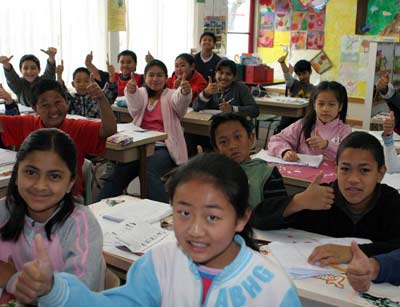Boys' English grades are up to a tenth worse when high numbers of girls are in the class with them, though girls' grades are unaffected. 研究發(fā)現(xiàn),當(dāng)班上女生人數(shù)較多時(shí),男生的英語(yǔ)成績(jī)要下降10%,而女生們的成績(jī)則不受影響。
Boys do worse in English when there are girls in their class, researchers will say today, contradicting the widely held belief that girls are always a good influence on boys in school. 研究人員今天稱,當(dāng)班上女生人數(shù)較多時(shí),男生的英語(yǔ)就會(huì)學(xué)得較差。而人們以往普遍認(rèn)為,在學(xué)校中,女生對(duì)男生總是有積極影響。

Boys do best with "as few girls as possible" in English lessons at primary and secondary school, Steven Proud, a research student at Bristol University, will tell the Royal Economic Society's conference. 布里斯托大學(xué)的研究生Steven Proud將在皇家經(jīng)濟(jì)學(xué)會(huì)的回憶上宣布:小學(xué)與初中的英語(yǔ)課上,女生越少,男生成績(jī)?cè)胶谩?/p>
But when it comes to maths and science, both boys and girls at primary school achieve up to a tenth of a grade more when there is a high proportion of girls in the class, Proud found. 然而Steven Proud同時(shí)發(fā)現(xiàn)在數(shù)學(xué)與科學(xué)學(xué)科上,女生人數(shù)多對(duì)男女生都有積極影響——成績(jī)提高10%。
Proud tracked boys' and girls' test results at the ages of seven, 11, 14 and 16 in 16,000 schools in England between 2002 and 2004 for his PhD. 在2002年至2004年間,Proud為了完成博士研究課題,跟蹤查詢了英格蘭16000所學(xué)校中7歲、11歲、14歲、16歲的男女生測(cè)試成績(jī)。
Boys consistently perform up to a tenth of a grade worse when they study English with high numbers of girls as opposed to few or no girls, Proud found. Pround發(fā)現(xiàn),相比于班上沒(méi)有或者很少女生之時(shí),當(dāng)班上女生人數(shù)較多時(shí),男生的英語(yǔ)成績(jī)總是會(huì)下降10%。
The more girls there are in an English class, the worse boys perform. This is particularly the case in primary schools, he discovered. 特別是在小學(xué),女生越多,男生的英語(yǔ)就學(xué)得越差。
Girls, who outperform boys in English at every stage at school, are unaffected by the number of boys in their English classes.在學(xué)校的各個(gè)階段英語(yǔ)表現(xiàn)都要強(qiáng)過(guò)男生的女生英語(yǔ)成績(jī)則不受男生人數(shù)影響。
He said: "The results imply that boys would benefit at all ages from being taught English with as small a proportion of girls as possible. In maths and science, the results tend to imply that both boys and girls benefit from having more girls in the classroom. A mix of the genders in both science and maths is optimal." Proud稱:“研究結(jié)果表明了,如果能降低英語(yǔ)課上女生人數(shù)比例,所有年齡組男生的英語(yǔ)成績(jī)都將受益。在數(shù)學(xué)和科學(xué)學(xué)科上,研究結(jié)果表明女生多對(duì)班級(jí)中的男女生都有好處。數(shù)學(xué)與科學(xué)學(xué)科中,性別混合是最優(yōu)化的選擇。”
(英語(yǔ)點(diǎn)津Jennifer編輯)
相關(guān)閱讀:
“會(huì)飛”的照相機(jī)和相片
豬流感常識(shí)早知道
長(zhǎng)啥樣的人養(yǎng)啥樣的狗
小孩子天生知道根據(jù)性別選玩具?